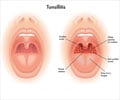The use of codeine to treat pain following a tonsillectomy could prove fatal for some children, a new report has warned.
The use of codeine to treat pain following a tonsillectomy could prove fatal for some children, a new report has warned.
Dr. Gideon Koren from The University of Western Ontario investigated the death of a two-year-old boy following a relatively easy operation to remove his tonsils.Enlarged tonsils are usually treated with antibiotics, but Koren says tonsillectomies are still performed in the case of sleep apnea, where the child stops breathing while asleep.
In this case, the toddler had a history of snoring and sleep-study-confirmed sleep apnea. He was taken to an outpatient clinic, had the operation, and was taken home.
The mother was given syrup of codeine and instructed how to administer it to her child for pain relief. On the second night after surgery, the child developed a fever and wheezing, and was found dead the next morning.
Tests later showed the mother had given the proper dosage, and yet the child's body was found to have high levels of morphine. The coroner asked Koren to look at the case.
"The sudden death of a healthy child was quite sobering because tonsillectomies are done every day, all over North America. And more and more of them are done on an outpatient basis, with the child going home the same day," Koren said.
Koren has another concern about giving codeine to children after a tonsillectomy for sleep apnea.
The report has been published in the New England Journal of Medicine.
Source-ANI
LIN
 MEDINDIA
MEDINDIA



 Email
Email






